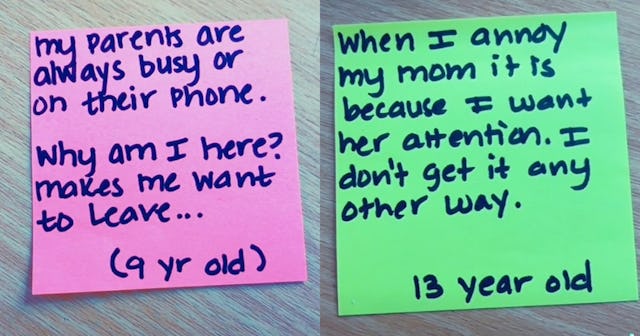A Trauma Counselor Shared The Heartbreaking Things Her Child & Teen Clients Have Told Her
The anonymous thoughts on the family counselor's now-viral TikToks brings kids' real fears into focus.

Unfortunately, no matter how hard a parent may try, completely shielding a child from trauma is impossible. What parents can do, however, is make sure they are actively listening and learning as much as they can about family dynamics and trauma.
This is exactly what one trauma counselor aimed to do by sharing some of the things her child and teen clients have told her about their parents — and their thoughts go to show that kids are much more aware of familial dynamics than their parents might give them credit for.
“I didn’t expect to cry so much. Or how much our kids really ‘see’ and understand,” reads one comment.
The counselor, whose handle is Ask.Courtney, has 18 years of trauma counseling experience. After asking the clients for permission, she anonymously wrote up some of the things that they had told her, ranging from how they feel like their parents care more about their phones than them to how certain discipline styles do the exact opposite of what their parent is trying to achieve.
Comments quickly poured in from those who also experienced trauma as a child, or from those looking for advice on how to work through any family trauma with their own children. Others revealed communication methods that they use with their own children.
”My 8 year shuts down when something bothers her. she now has a note pad and drop box to share and loves it! me too! 🥰,” commented one mom. “I love that!” Courtney replied.
Courtney also tells Scary Mommy that there is “no such thing as a perfect parent” and that every parent, no matter how well-versed or emotionally balanced they are, will make mistakes. After all, to err is human!
“We've all been on our phones too much because we've needed to zone out after a long day or were stuck so deep in our own minds that we didn't give our children the attention they needed, or simply bailed out of a tea party because we were too overstimulated. It's okay — learning to take responsibility, showing accountability, and repairing are the ultimate goals,” she explains.
Courtney also reveals that there are many ways to open up communication with a child any parent senses might need to work through some trauma. Having an objective third party, like a counselor, can be helpful. She tells Scary Mommy that it is totally normal to want to know “what happened” in a session, “but it's equally as important that the relationship between child and counselor remain safe and that means that parents won't always be privy to what is said.”
So, how do parents go about productively asking their kids about therapy sessions? Courtney says simple questions are the way to go. “What was your favorite part of therapy today?” is a good ice-breaker. Courtney notes that if a parent sees a child tense up at the question, it’s important to let them know you aren’t upset for not being forthcoming.
“You can say, ‘I get it, you feel safe talking to [Counselor Name]. I like that, and I am happy that you have them to talk to. I want you to know that I, too, am working hard and when you are ready, I'd love to be a safe place for you where I can listen’ — the best thing to do is respect that emotional boundary that's popping up for them.”
Ultimately, it’s about keeping the conversation going. Courtney gave Scary Mommy a few ways to start the conversation, namely by asking for permission first: "I realize that we need to communicate more and I think that starts with me becoming a better listener. Like you, I am still growing and learning new things each day. Thank you for being patient with me. I know sometimes I haven't listened to you. I know how frustrating that is. So, I'd like to ask you a couple of questions. Are you ok with that?”
Courtney shared a couple other questions that can help get the ball rolling, noting that remaining neutral as a child shares is critical:
- "If there was one thing at home that you could change, what would that be?"
- "What is one thing in your life that you'd like to have more control over?”
The final step to opening up that communication bridge between a parent and a child? Having the parent look at what triggers them (i.e., what sets them off and causes them to “snap” at their child), because chances are, the parent’s inner child needs some healing, too. “The more we know about ourselves, our childhood, and what we need now as adults the better we can heal and the more emotionally present we can be for our children,” Courtney explains.
“As parents, we mustn't strive for perfection but for growth,” Courtney concludes. “Be gentle with yourself as you grow and keep showing up…it truly takes a village.”
For parents who want more advice as to how to navigate talking therapy with their children, check out Courtney’s podcast “Healing Trauma & Mental Health: In It Together with J & Courtney”, which covers self-improvement and mental health from a couple’s perspective.